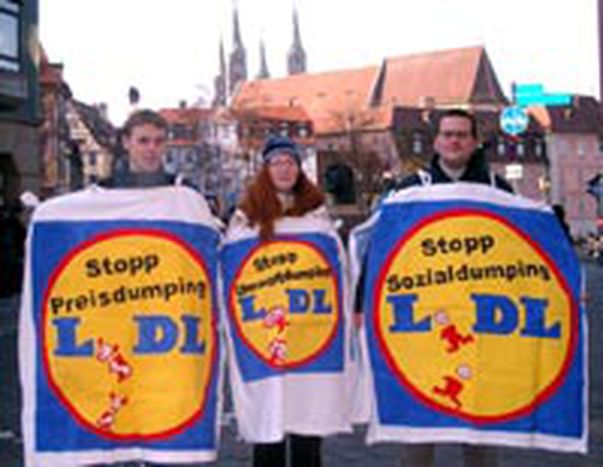
Lidl cracks the whip
Published on
Translation by:
 akasemi newsome
akasemi newsome
Lidl supermarkets are a familiar sight in malls around Europe, popular among students and cash-strapped families. But according to the German services employees’ union, ver.di, Lidl supervisors repress their workers and enforce 45-hour work weeks.
When she started her job, Krystyna W. of Wroclaw, Poland, regularly clocked 45-hour work weeks. As time went by, her hours steadily increased until she worked as many as 16 hours a day. Such long workdays are typical in the Polish subsidiaries of Germany’s biggest discount store, Lidl. Ver.di, a service employees union based in Germany, discloses these and other European labour practices in a new book released in June 2006, Selling Cheap at the Employees’ Expense: The Black Book on the Schwarz Retail Company, by Andreas Hamann and a research team.
Everyday overtime
Globalisation means one thing to Lidl: high profits at low cost, states the foreword of the Black Book. Relying on this tried and true formula, Lidl applies it in stores across Europe. As ver.di has documented, this mantra of high profits at low cost means that Lidl places its workers under a great deal of stress, forcing them to work overtime and using every means at its disposal to stifle worker organization.
Make no mistake, Lidl does not break the law. In Scandinavia, for example, Lidl must abide by national laws governing worker representation and labour conditions. But if the supermarket chain can find a legal loophole, it exploits it to the detriment of its employees. The Black Book notes, 'frequent quality checks and timed tests ensure that employees stay on their toes,' and 'unions blame the rigid hierarchy of Lidl’s corporate structure for the constant discord among affiliates.'
Stopping a race to the bottom
Currently the Dieter Schwarz Group owns 7,400 Lidl and Kaufland stores in 23 European countries and plans to expand in Eastern Europe. Given that the company tallied a profit of EUR 40 billion, 50 percent of which came from overseas business, in 2005, the Schwarz Group expects even greater returns after it opens stores in Croatia, Slovenia, the Baltic Countries and Switzerland.
'We need to stop the race to the bottom and fight for global social standards,' assert the authors of the Black Book, ver.di president, Frank Bsirske and vice-president Margret Moenig-Raane. Ver.di wants to join forces with other European unions so that all the employees of the Schwarz group, whether in Poland, France or Sweden can work with dignity under decent and humane conditions.
Andreas Hamann and Gudrun Giese also worked on the 'Black Book on the Schwarz Retail Company' (December 2004).
Translated from Lidl: Ausbeutung, europaweit


